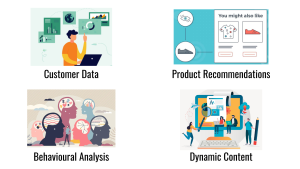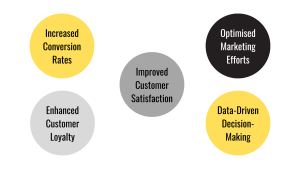content
E-Commerce Development
December 12, 2023
6 min read
Introduction
In the ever-evolving landscape of e-commerce, staying ahead of the competition requires a strategic focus on enhancing the customer experience. One of the most effective ways to achieve this is through ecommerce personalisation. This transformative approach tailors the online shopping journey to the individual preferences and behaviours of each customer. Leveraging ecommerce personalisation as advanced software solutions, businesses can create a more engaging, relevant, and ultimately satisfying experience for their users.
Understanding Ecommerce Personalisation
Ecommerce personalisation is a strategic approach that involves tailoring the online shopping experience to meet the specific needs and preferences of each individual customer. Rather than employing a generic, one-size-fits-all model, businesses leverage data and technology to deliver personalised content, product recommendations, and promotions. The goal is to create a more engaging and relevant experience, ultimately fostering customer satisfaction and loyalty.
Key Elements of Ecommerce Personalisation

- Customer Data. The foundation of ecommerce personalisation lies in data. Customer information, including purchase history, browsing behaviour, and demographic details, forms the basis for creating personalised experiences.
- Behavioural Analysis. Analysing customer behaviour provides insights into their preferences, interests, and purchase patterns. This data is then used to predict future actions, allowing businesses to proactively meet customer needs.
- Product Recommendations. Recommendation engines, powered by machine learning algorithms, offer personalised product suggestions based on past purchases, viewed items, and similar customer preferences. This feature enhances the discovery process for users.
- Dynamic Content. Personalised content management systems enable businesses to dynamically adjust website content based on individual user profiles. This includes personalised landing pages, banners, and promotional materials.
The Role of Software in Ecommerce Personalisation
Implementing a successful ecommerce personalisation strategy requires robust software solutions that can analyse vast amounts of data in real-time and deliver personalised experiences seamlessly. Several key software components contribute to the effectiveness of personalisation in e-commerce:
- Customer Relationship Management (CRM) Systems: CRM systems play a crucial role in collecting and managing customer data. By analysing customer interactions and purchase history, businesses can gain valuable insights into individual preferences.
- Machine Learning Algorithms: Machine learning algorithms are at the heart of ecommerce personalization. These algorithms analyse customer data to predict future behaviour and preferences, enabling businesses to offer personalised product recommendations and content.
- Recommendation Engines: Recommendation engines leverage machine learning to provide personalised product suggestions based on past purchases, browsing history, and other relevant data. This feature significantly enhances the discovery process for customers, leading to increased sales and customer satisfaction.
- Personalised Content Management Systems: These systems enable businesses to dynamically adjust website content based on individual user preferences. Personalised content, such as landing pages and promotional banners, creates a more engaging and relevant experience for each visitor.
Benefits of Ecommerce Personalisation

- Increased Conversion Rates: Personalised experiences lead to higher conversion rates as customers are more likely to make purchases when presented with relevant products and offers.
- Enhanced Customer Loyalty: By demonstrating an understanding of individual preferences, businesses can build stronger connections with customers, fostering loyalty and repeat business.
- Improved Customer Satisfaction: Personalisation contributes to a more enjoyable and efficient shopping experience, leading to increased customer satisfaction and positive reviews.
- Optimised Marketing Efforts: Personalisation enables businesses to target their marketing efforts more effectively, delivering messages and promotions that resonate with specific customer segments.
- Data-Driven Decision-Making: Ecommerce personalisation relies on data analysis, empowering businesses to make informed decisions based on customer behaviour and preferences.
Conclusion
Ecommerce personalisation, fueled by advanced software solutions, is a game-changer for businesses looking to elevate their customer experience. By leveraging customer data, machine learning, and personalised content, businesses can create a highly tailored online shopping journey that not only delights customers but also drives increased sales and brand loyalty. As technology continues to advance, the potential for ecommerce personalisation to reshape the online retail landscape is limitless. Businesses that prioritise and invest in these personalised experiences are poised to thrive in the competitive world of e-commerce.
If you have any questions or an idea for an ecommerce software, contact us via sales@instandart.com or fill out the form on the main page of the site to discuss. We are always ready to help!
